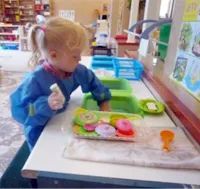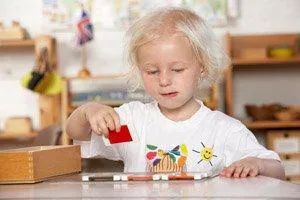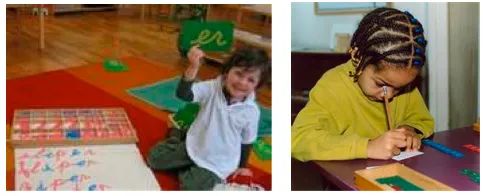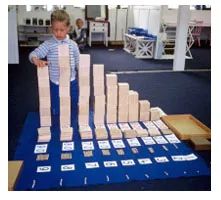Montessori FAQ: What Are "The Four Avenues of Learning?"
I have heard Montessori teachers refer to "The Four Avenues of Learning"; what are these four avenues and how will my child benefit from this teaching method?
 Learning coordination, concentration, balance
Learning coordination, concentration, balance
and a sense of order ... to name a few.
The Montessori Method for very young children (ages 2½-6 years) is structured around 4 main avenues of learning:
- Practical Life
- Sensorial Development
- Development of Language
- Early Preparation of the Mathematical Mind
PRACTICAL LIFE

Practical Life exercises help develop coordination of movement, concentration, and independence. Through these lessons, children learn a sense of order as well as basic social skills through practical life tasks. These lessons can be further separated into 4 main categories: care of self, care of the environment, grace and courtesy and refinement of movement. (More about practical life.)
- Care of self includes such lessons as buttoning, zipping and hand washing.
- Care of the environment activities include everyday tasks such as dusting, washing a table or sweeping.
- Grace and Courtesy practical life lessons teach children important societal expectations and manners such as proper greetings, introductions and non-verbal customs like hand-shaking. Grace and Courtesy lessons vary depending on the local culture.
- Movement lessons are designed to assist the child in coordination and control of movements through activities such as marching, dancing or "walking on the line."

SENSORIAL DEVELOPMENT
As the name implies, Sensorial Development lessons teach through development of the five senses: sight, sound, smell, taste and touch. Sensory development brings its own refinement of the senses but also prepares the child for more advanced lessons in math, science and music. (Read more...)

DEVELOPMENT OF LANGUAGE
Children begin to learn language at birth (or perhaps even before) and easily absorb words and word-meanings for the first several years of life. Early Development of Language lessons start with basic spoken language, vocabulary and phonemic awareness. Children advance to learning letters, then words, then building sentences. All of which ultimately leads to the development of reading and writing skills. (Read more...)
 The Montessori Method uses tangible materials to teach young children the abstract concepts of math.
The Montessori Method uses tangible materials to teach young children the abstract concepts of math.

EARLY PREPARATION OF THE MATHEMATICAL MIND
The Montessori Method uses tangible materials to teach young children the abstract concepts of math. Children learn the fundamentals of mathematical thinking which, in turn, lays the foundation for them to advance into basic arithmetic: addition, subtraction, multiplication and division. (Read more...)
Mastery of these preliminary skills bolsters self-confidence and develops essential motor skills needed to advance to more complex lessons. Children learn both confidence and competence through these early avenues of learning in a community of children all working on their areas of interest. And they have fun learning and mastering new challenges!




















